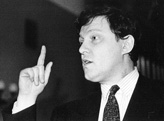 This
years Liberal International Prize for Freedom has been awarded to Grigory
Yavlinsky, head of the Russian Democratic Party Yabloko, for his defence
of liberal democracy and market economics in both the USSR and the Russian
Federation. Yavlinsky’s political career began in 1990 when Boris
Yeltsin appointed him deputy chairman of the RSFSR (Russian Soviet Federated
Socialist Republic) Council of Ministers and the chairman of the State
Commission of the RSFSR for Economic Reform. Yavlinsky proposed his “500
Days” plan, which intended to shift the Soviet economy onto the path
of market reform. Unfortunately the Congress of the People’s Deputies
rejected the plan. However, Yavlinsky was able to use the principles of
the “500 Days” plan in the Nizhni Novgorod province, where
he implemented successful economic reforms. This
years Liberal International Prize for Freedom has been awarded to Grigory
Yavlinsky, head of the Russian Democratic Party Yabloko, for his defence
of liberal democracy and market economics in both the USSR and the Russian
Federation. Yavlinsky’s political career began in 1990 when Boris
Yeltsin appointed him deputy chairman of the RSFSR (Russian Soviet Federated
Socialist Republic) Council of Ministers and the chairman of the State
Commission of the RSFSR for Economic Reform. Yavlinsky proposed his “500
Days” plan, which intended to shift the Soviet economy onto the path
of market reform. Unfortunately the Congress of the People’s Deputies
rejected the plan. However, Yavlinsky was able to use the principles of
the “500 Days” plan in the Nizhni Novgorod province, where
he implemented successful economic reforms.
In 1993 he formed the democratic Yabloko (Yavlinsky-Boldyrev-Lukin)
party, which works for what Yavlinsky believes are fundamental values:
human rights, democracy, the rule of law, private property, and market
economy. Yabloko won 27 seats in the Duma in 1993 and 45 seats in 1995.
Yavlinsky headed the Yabloko faction and emerged as a resolute critic
of Yeltsin’s policies. The fall of the Soviet Union, saw Yabloko,
with Yavlinsky at its head, emerge as the foremost voice of democratic
principles in the Russian Federation. Yabloko has been a rigorous and
uncompromising critic of the Putin government on numerous issues including
housing, the importing of radioactive waste, and electricity sector reforms,
and in April 2003, Yavlinsky collected signatures for the resignation
of the government.
Yavlinsky was a presidential candidate in the 1996 presidential election,
coming in fourth, and in the 2000 presidential election, coming in third.
Throughout each campaign he asserted, “Only a new generation of
Russian politicians can be strong enough to preserve human rights, democracy,
and the future of the country.”
In both his presidential campaigns, Yavlinsky promised that he would
grant the Chechens full independence if they voted for succession, thereby
ending the killing of thousands of innocent Chechens. Throughout his entire
political career, Yavlinsky has been an outspoken advocate for the basic
rights of the Chechen people, criticizing the governments of both the
Soviet Union and Russian Federation for conducting a war against the people,
not the terrorists. In 1994 he helped to negotiate the release of Russian
prisoners held by Chechen guerrillas and in 2002 he put his life on the
line, going into the Dubrovka St. theatre to negotiate with the Chechen
terrorists holding hostages there.
Grigory Yavlinsky was born on 10 April 1952 in the Ukrainian city of
Lvov where his father ran an orphanage and his mother taught at the local
forestry school. In 1969 Yavlinsky entered Plekhanov Institute of National
Economy in Moscow, where he obtained his Ph.D. degree in Economics. Yavlinsky
held a number of research and managerial positions in the Institute of
Coal Industry and Management, the Russian Institute of Labour, and the
USSR State Committee for Labour and Social Issues, before entering politics.
Yavlinsky is married and has two sons.
See also:
YABLOKO
as a member of Liberal International
|